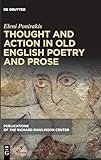Thought and Action in Old English Poetry and Prose / Eleni Ponirakis.
Material type: TextSeries: Publications of the Richard Rawlinson CenterPublisher: Kalamazoo, MI : Medieval Institute Publications, [2023]Copyright date: ©2024Description: 1 online resource (XIV, 202 p.)Content type:
TextSeries: Publications of the Richard Rawlinson CenterPublisher: Kalamazoo, MI : Medieval Institute Publications, [2023]Copyright date: ©2024Description: 1 online resource (XIV, 202 p.)Content type: - 9781501518522
- 9781501514456
- 9781501514418
- 829.09 23
- PR173 .P66 2024
- online - DeGruyter
- Issued also in print.
| Item type | Current library | Call number | URL | Status | Notes | Barcode | |
|---|---|---|---|---|---|---|---|
 eBook
eBook
|
Biblioteca "Angelicum" Pont. Univ. S.Tommaso d'Aquino Nuvola online | online - DeGruyter (Browse shelf(Opens below)) | Online access | Not for loan (Accesso limitato) | Accesso per gli utenti autorizzati / Access for authorized users | (dgr)9781501514418 |
Frontmatter -- Acknowledgements -- Contents -- Note on Editions -- Abbreviations -- Introduction -- Chapter 1 Mental and Physical Acts in Old English Prose: the Alfredian Translations, the Sermons of Ælfric, and The Old English Benedictine Rule -- Chapter 2 Body and Soul: Thought and Action in The Seafarer -- Chapter 3 A New Kind of Hero? Thought and Action in The Battle of Maldon -- Chapter 4 A State of Mind: Byrhtnoð and Maldon in the Context of Æðelred’s Eard -- Chapter 5 The Devil’s Lar: Mental Manipulation in Juliana -- Conclusion -- Bibliography -- Index
restricted access online access with authorization star
http://purl.org/coar/access_right/c_16ec
Cognitive approaches to early medieval texts have tended to focus on the mind in isolation. By examining the interplay between mental and physical acts deployed in Old English poetry and prose, this study identifies new patterns and offers new perspectives. In these texts, the performance of right or wrong action is not linked to natural inclination dictated by birth; it is the fruit of right or wrong thinking. The mind consciously directed and controlled is open to external influences, both human and diabolical. This struggle to produce right thought and action reflects an emerging democratization of heroism that crosses societal and gender boundaries, becoming intertwined with socio-political, soteriological, and cultural meaning. In a study of influential prose texts, including the Alfredian translations and the sermons of Ælfric, alongside close readings of three poems from different genres – The Seafarer, The Battle of Maldon, and Juliana –, Ponirakis demonstrates how early medieval authors create patterns of interaction between the mental and the physical. These provide hidden keys to meaning which, once found, unlock new readings of much studied texts. In addition, these patterns of balance, distribution, and opposition, reveal a startling similarity of approach across genre and form, taking the discussion of the early medieval conception of the mind, soul, and emotion, not to mention conventional generic divisions, onto new ground.
Issued also in print.
Mode of access: Internet via World Wide Web.
In English.
Description based on online resource; title from PDF title page (publisher's Web site, viewed 25. Jun 2024)


